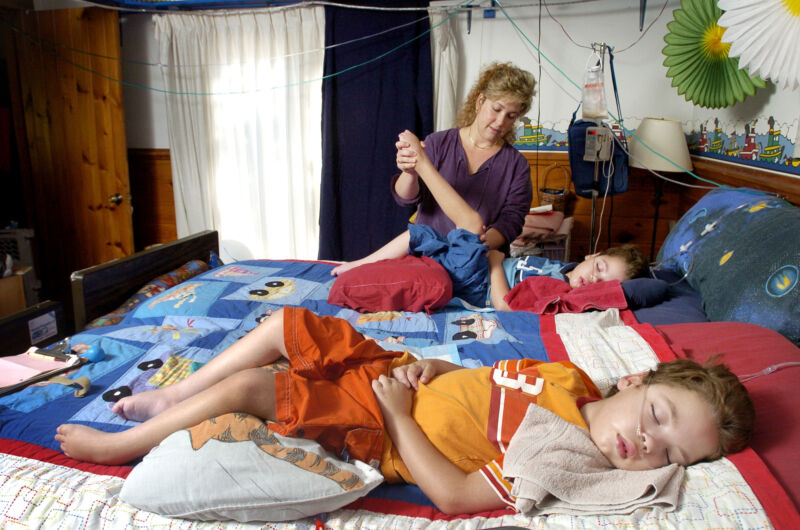promising but pricey —
It’s unclear if government and private insurance plans can cover the costs.

Enlarge / A mother with her twin 6-year-old boys who have metachromatic leukodystrophy, a genetic disease that leaves them unable to move. Photo taken on September 3, 2004.
In a medical triumph, US Food and Drug Administration on Monday approved a gene therapy that appears to trounce a rare, tragic disease that progressively steals children’s ability to talk, move, and think, leading to a vegetative state and death. For those who begin to slip away in infancy, many die by age 5. But, with the new therapy, 37 children in an initial trial were all still alive at age 6. Most could still talk, walk on their own, and perform normally on IQ tests, which was unseen in untreated children. Some of the earliest children treated have now been followed for up to 12 years—and they continue to do well.
But, the triumph turned bittersweet today, Wednesday, as the company behind the therapy, Lenmeldy, set the price for the US market at $4.25 million, making it the most expensive drug in the world. The price is $310,000 higher than what experts calculated to be the maximum fair price for the lifesaving drug; the nonprofit Institute for Clinical and Economic Review, or ICER, gave a range last October of between $2.29 million to $3.94 million.
The price raises questions about whether state, federal, and private health insurance plans will be able to shoulder the costs. “Unless states have allocated appropriately for it, and looked at the drug pipeline, they may not be prepared for what could be significant cost spikes,” Edwin Park, a research professor at the McCourt School of Public Health at Georgetown University, told CNN.
It’s also unclear whether the drug can reach the children who need it in time. Lenmeldy must be given before symptoms develop or early on in symptom development in children. However, diagnosis of the rare genetic condition can be slow, and many children treated so far were identified because older siblings, now too old for treatment, developed the condition first.
Devastating disease
Stat, for instance, spoke with the mother of an 8-year-old with the condition, who can no longer talk or move, has frequent seizures, and requires a feeding tube and 28 different medications. Meanwhile, her 3-year-old brother, who has the same genetic mutation, is a typical toddler—he was able to get the new treatment when he was six months old. To get it, the family flew him to Milan, Italy, where Lenmeldy was first developed. It was approved for use in Europe in 2021.
The condition Lenmeldy treats is called metachromatic leukodystrophy (MLD), which occurs in about 40 children in the US each year. MLD is caused by a mutation in the gene that codes for the enzyme arylsulfatase A (ARSA). Without this enzyme, the body can’t break down sulfatides, a fatty substance that then builds up to toxic levels in the brain and peripheral nervous system. Sulfatides are essential components of myelin, the fatty insulation on nerve cells critical for quick transmission of electrical impulses. But, too much sulfatides leads to a loss of myelin, which gradually destroys myelin producing cells and leads to nervous system damage.
Lenmeldy prevents that damage by giving the body a working copy of the ARSA gene. In a one-time infusion, patients are given a dose of their own blood stem cells that have been genetically engineered to contain a functional ARSA gene. Patients undergo chemotherapy to clear out their own stem cells from bone marrow so the genetically modified cells can replace them. The engineered stem cells then produce myeloid cells that travel around the body in the blood, producing ARSA enzyme that can halt progression of MLD.
It’s unknown how long the therapy lasts, but it’s clearly buying children time and giving them hope for a full, normal life.
“MLD is a devastating disease that profoundly affects the quality of life of patients and their families,” Nicole Verdun, director of the FDA’s Office of Therapeutic Products, said in a statement. “Advancements in treatment options offer hope for improved outcomes and the potential to positively influence the trajectory of disease progression.”
It “has the potential to stop or slow the progression of this devastating childhood disease with a single treatment, particularly when administered prior to the onset of symptoms,” Bobby Gaspar, CEO of Lenmeldy’s maker, Orchard Therapeutics, said in a statement Wednesday. “We are committed to enabling broad, expedient, and sustainable access to this important therapy for eligible patients with early-onset MLD in the US.”
The company is working on expanding newborn screening to include tests for MLD, to try to find children early, Orchard reported. Still, with such a rare condition, it’s unclear if the pricey drug will be a moneymaker for the company. Stat notes that Orchard has previously abandoned four therapies for other rare genetic conditions because of the difficulty in meeting regulatory standards for essentially custom therapies and questions about whether health plans will pay the steep, multimillion-dollar prices. In April of last year, Belgium, Ireland, and the Netherlands walked away from price negotiations with the company, saying they couldn’t come to an agreement on this “extremely expensive therapy.”